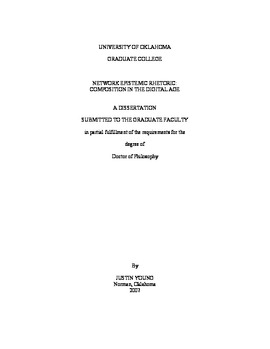| dc.contributor.advisor | Hobbs, Catherine, | en_US |
| dc.contributor.author | Young, Justin. | en_US |
| dc.date.accessioned | 2013-08-16T12:21:01Z | |
| dc.date.available | 2013-08-16T12:21:01Z | |
| dc.date.issued | 2007 | en_US |
| dc.identifier.uri | https://hdl.handle.net/11244/1302 | |
| dc.description.abstract | This project will begin with an examination of social epistemic rhetoric in relation to the scholarship of computers and composition, complexity theory and the post-process movement. Next, the critical methodology suggested by Berlin, as well as the theoretical work of Debord, Foucault and Hardt and Negri, will be drawn upon to analyze forms of power, subjectivity, and resistance in the digital discourses of online social networks and personal weblogs. The project will then turn to an examination of the importance of student-centered pedagogy to composition in the digital age, and conclude with a discussion of "network epistemic rhetoric"---a refiguration of social epistemic rhetoric for the 21st century---and its pedagogical application within the context of a composition course focused on globalization and the university. | en_US |
| dc.description.abstract | The paradigm of social epistemic rhetoric, established by James Berlin, is a rhetoricized and historicized approach to textual analysis and production which takes as its purpose the education of students for democratic engagement. However, a number of scholars such as Taylor and Terranova argue that a new historical period, marked by the rapid globalization and informatization of society, may now be emerging. As such, social epistemic rhetoric may not offer an adequate response to the emerging conditions of a globalized, network culture. | en_US |
| dc.format.extent | v, 172 leaves : | en_US |
| dc.subject | Rhetoric Social aspects. | en_US |
| dc.subject | Culture. | en_US |
| dc.subject | Rhetoric Study and teaching. | en_US |
| dc.subject | English language Composition and exercises. | en_US |
| dc.subject | English language Rhetoric Study and teaching. | en_US |
| dc.subject | Language, Rhetoric and Composition. | en_US |
| dc.title | Network epistemic rhetoric: Composition in the digital age. | en_US |
| dc.type | Thesis | en_US |
| dc.thesis.degree | Ph.D. | en_US |
| dc.thesis.degreeDiscipline | Department of English | en_US |
| dc.note | Adviser: Catherine Hobbs. | en_US |
| dc.note | Source: Dissertation Abstracts International, Volume: 69-01, Section: A, page: 0206. | en_US |
| ou.identifier | (UMI)AAI3291935 | en_US |
| ou.group | College of Arts and Sciences::Department of English | |
